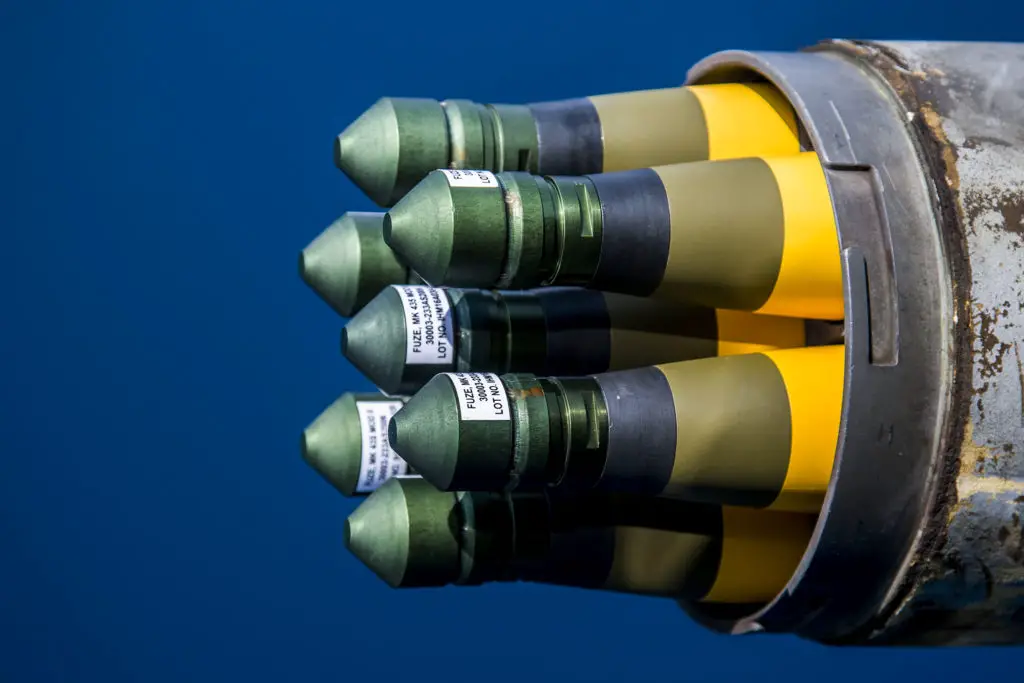BAE Systems was awarded an almost $2.7 billion contract to procure Advanced Precision Kill Weapon System precision guidance units for 2.75-inch rockets, the U.S. Department of Defense said in a release.
The $2,684,650,000 firm-fixed-price, indefinite-delivery/indefinite-quantity contract (N00019-19-D-0026) procures WGU-59/B APKWS II units full rate production Lots 8-12 for the U.S. Navy, Army and Air Force, as well as for foreign military sales including to the governments of Iraq, Lebanon, Netherlands, Jordan, Afghanistan, United Kingdom, Tunisia, Philippines and Australia, the Wednesday, September 25 release said.
Work will be performed in Hudson, New Hampshire (54%) and Austin, Texas (46%) and is expected to be completed in December 2025.
Advanced Precision Kill Weapon System


APKWS upgrades 2.75-inch (70 mm) rockets to a semi-active laser guided precision weapon. The system is a design conversion for Hydra 70 unguided rockets turning them into low-yield precision-guided munitions to help avoid collateral damage.
The modular design enables the system to be fitted to existing and new unguided rockets, inserting between the motor and warhead, and has been fired from more than than 20 fixed- and rotary-wing aircraft types, from fast jets to light helicopters.
BAE says APKWS is designed to lock on to both moving and stationary targets from more than 3 km (1.9 miles) away. The system has a minimum range of 1.5 km and a maximum of 5 km.
The system uses advanced seeker optics on four guidance wings that are deployed after firing. This Distributed Aperture Semi-Active Laser Seeker (DASALS) technology allows the four seekers to work together as a single unit.
BAE says the system has achieved a greater than 93% hit rate in combat operations, and cites an 80% hit probability within 2 m of the center of the laser spot per single shot.
BAE claims the APKWS is the most cost effective laser-guided munition in its class, enabling “a precision-strike capability at a quarter the price of a Brimstone missile.”
BAE has said its New Hampshire production plant in the U.S. that opened in 2016 has a capacity of 20,000 units per year with production continuing to expand.
Increasingly popular low-cost precision guided rocket
In February, BAE was awarded a contract to produce 9,999 APKWS units for the U.S., Nigeria and the Netherlands. The $225 million contract for Lot 7 full-rate production APKWS units put the unit price at approximately $22,500. Costs for the system appear stable – in June 2018, BAE Systems was awarded a $224 million contract to produce 10,185 APKWS guidance units.
At those unit prices, Wednesday’s $2.7 billion contract would equate to roughly 119,000 units, but in May, BAE was awarded a $10.9 million contract for the “upgrade” of the APKWS guidance section, combining the rotary-wing and fixed-wing guidance sections in a single hardware and software solution, which could suggest a change in unit pricing. Work on the upgrade expected to be completed in April 2021.
The APKWS system appears to be an increasingly popular addition to U.S. foreign military sales.
In July, the U.S. State Department approved the $600 million sale to Greece of up to seven Sikorsky MH-60R multi-mission helicopters including 100 APKWS precision-guided rockets, and earlier this week, the State Department cleared Thailand’s purchase of eight Boeing AH-6i light attack/reconnaissance helicopters, an estimated $400 million sale that includes 200 APKWS precision-guided rockets.



